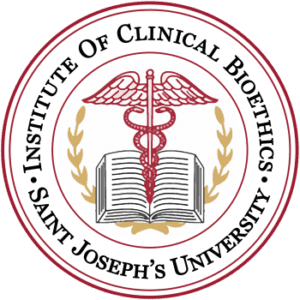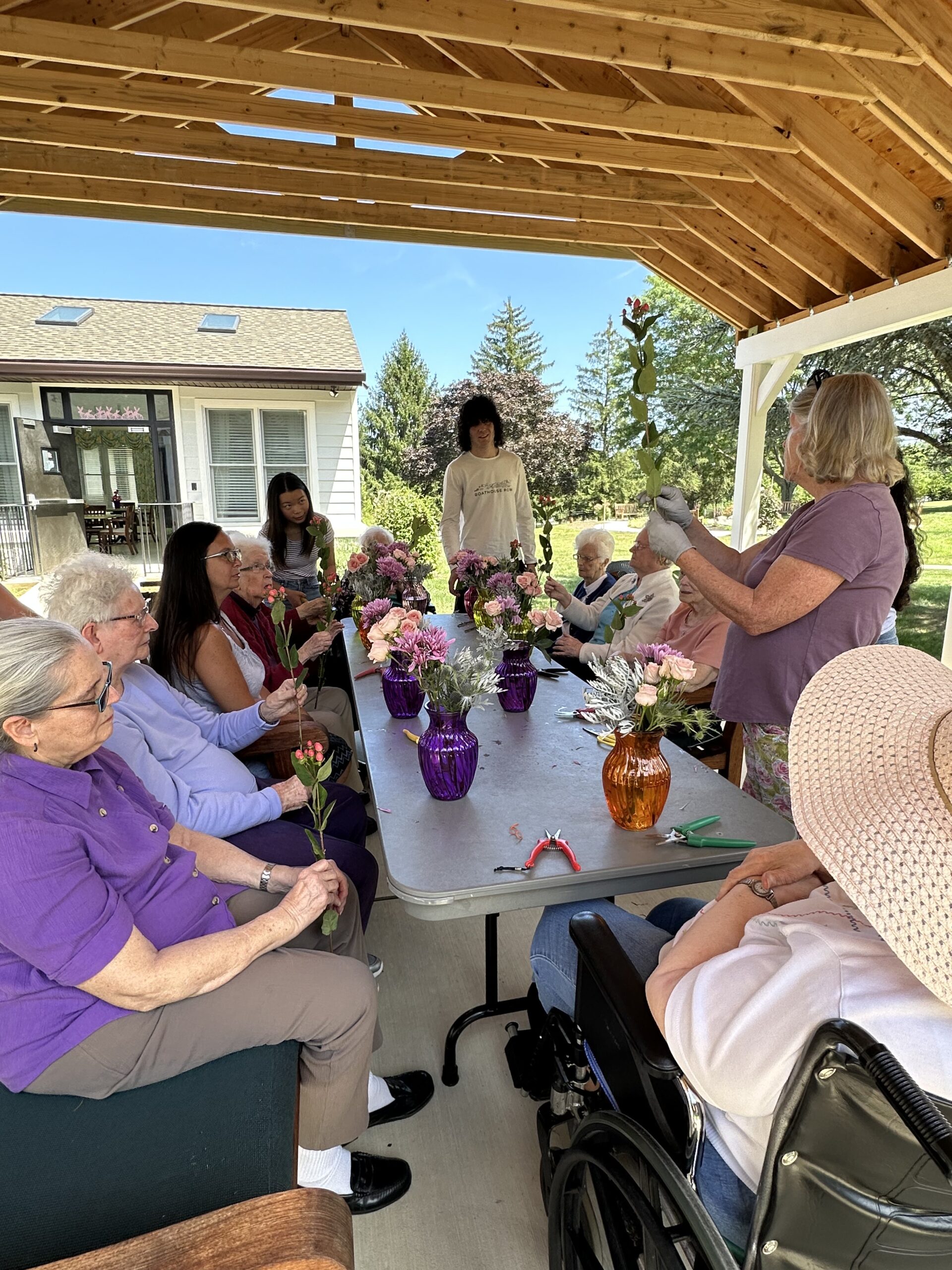Nouhad Khoury (Biology, ’26)
The Therapeutic Horticulture Project has been a truly meaningful experience that has brought people together and fostered a sense of community. Working with plants in different structured activities has encouraged social connection and teamwork between the students and our patients. As one of the team members and leaders of this initiative, I am proud of what we have achieved. It has been rewarding to witness how something as simple as gardening can bring comfort, joy, and peace to everyone involved. Seeing that my brother, John, was an upcoming freshman at Saint Joseph’s University, I wanted to share this experience with him and welcome him into our community. Taking him to Assisi House, one of our horticulture locations, I got to observe firsthand my brother’s kindness and patience. He sat beside one of our older patients quietly listening to her as she shared stories about growing up with her family. Watching that interaction, I knew I had made the right decision in bringing him along. In the end, I am grateful for this project, not just for the impacts it has on our participants, but for the way it has brought my brother and I even closer.
John Khoury
As an upcoming freshman at SJU, I was both excited and nervous to begin this new chapter of my life. My sister suggested I join her this summer to help with the therapeutic horticulture sessions for the elderly patients suffering with dementia. Though I was full of excitement for this upcoming new experience I also felt a sense of anxiousness. I have always believed that we should care for one another as humans and that the smallest acts of kindness could create a long lasting impact on others. I have constantly set time in my life to volunteer and help others. I have worked with students who have disabilities, but it was my first time working with elderly. The experience was truly heartwarming and left a deep impact on me. I was able to connect with the patients in meaningful ways through the conversations and activities. These small acts of kindness like helping them garden and decorating cards with them was truly uplifting. Seeing them smile and feel included reminded me how much simple gestures matter. It made me recognize how important it is to help others feel valued and supported. This experience didn’t just bring joy to them, it filled me with a sense of gratitude. I am very grateful to my sister for encouraging me to be involved in this beautiful community.
Rachel Vemula (Biology, ’27)
This summer, my sister and I had the opportunity to participate in therapeutic horticulture sessions at the McAuley Convent, and it became one of the most meaningful ways we’ve grown together. Each morning drive there and every ride back gave us time to connect, free from distractions, just the two of us preparing for the day or reflecting on what we’d shared with the sisters. Working in the garden reminded us of summers spent with our grandmother, who loved teaching us to care for the earth with patience and love. Those early memories returned as we watered plants and pulled weeds alongside the sisters, laughing and exchanging stories. The experience not only brought back a sense of home, but also allowed us to build new memories rooted in care and connection. As we spent more time in the garden, we began forming deeper relationships with the sisters. They spoke openly about their lives, their callings, the people who shaped them, and the communities they had served. Listening to them reflect on what gave their lives meaning made us slow down and appreciate the beauty in a life lived with purpose. One sister would always ask about our week before sharing a memory from her years as a teacher or her time spent in prayer and nature. The garden became more than a place of service, it was a space of shared wisdom and quiet transformation. And through all of it, I was grateful to experience it with my sister by my side. Working together in such a meaningful space brought us closer in a way that only shared purpose, quiet reflection, and genuine care can.
Rhesa Vemula
Volunteering with my sister in the Therapeutic Horticulture project in McAuley opened my eyes to a new version of community building. In small but meaningful ways—planting flowers, trimming herbs, or simply sitting and listening—we connected with the sisters on a genuine and personal level. We didn’t only assist them, we got to know them as people and, in time, as “sisters.” Having the chance to see all of this happen alongside my own sister made the experience even more special because we grew even closer as we looked back. One day that stood out the most for me was when a sister and I realized that we both used to garden when we were younger. We talked about what we used to grow and how those memories bring us peace. That kind of friendship helped me see that healing and understanding often grow from the same ground we all share. Every time we visited, it felt like we were planting something meaningful, not just in the garden but also in our relationships. I am so thankful for this experience and all the bonds I made with the sisters.
Andren Chen (Biology, ‘26 )
From being part of the very first horticulture program that served the Jesuit fathers at SJU, I was blessed with the opportunity to take my experiences and implement a new horticulture program at Assisi House. Given this opportunity, I thought it would be a great idea to bring my little sister along and share the experiences that I have cherished over the past few years. Before the start of the program I wasn’t completely sure what to expect, even though I had participated in a similar program before. I wondered whether the sisters would remember us, or if it might be difficult to form a connection with them. But over these past months, working with the sisters and our horticulturist, Patti, it came to my realization that our presence matters more than the memories we make. Although some of the sisters may not remember who we are, I learned that joy, love, and humor doesn’t depend on what we can recall, but what is present in the moment. Also at the horticulture program, the sisters love to tell us their stories, even though sometimes fragmented in their storytelling, they are always meaningful. I am truly grateful to share these experiences with my sister, Fiona. Working alongside her has made this journey even more meaningful. I’ve always known her as a hard worker who gives her best in everything she does, but watching her patience and compassion with the sisters gave me a new perspective on who she is—and it warmed my heart. I am very blessed to share this opportunity with my sister, but I am also grateful for the sisters that make this program meaningful.
Fiona Chen
Every time I step onto the road outside the Assisi House after our session with the sisters, I always find myself feeling surreal. Though our role was to accompany them through activities to help slow the progression of dementia, each visit felt more like an intimate café date. These sisters are filled with so much life, bringing a sense of genuine warmth and comfort. I find time vanishes as the sisters take me on a journey, describing a memory untouched by their illness. Listening to them made me realize that they are not defined by their illness, but by their aspiration, values, and experiences. I find myself relating to their stories, recognizing the same hopes and dreams I carry for my future. They taught me lessons on how to carry myself and to find joy in the smallest moments. This project’s mission has truly found its way into my heart. Moving forward, I hope to continue walking alongside these wonderful sisters as they battle through dementia.
“These Therapeutic Horticulture sessions brought unexpected love and meaning into my life, something I never thought I needed. I am forever grateful to be part of this amazing team, especially with my brother, Andren. Without him motivating and inspiring me to step outside my comfort zone, I would never have been able to create these relationships with everyone I have met so far in this project.”
– Fiona Chen

